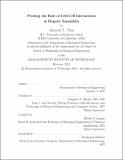Probing the role of cell-cell interactions in hepatic ensembles
Author(s)
Chen, Amanda X.
Download1252625642-MIT.pdf (10.80Mb)
Other Contributors
Massachusetts Institute of Technology. Department of Biological Engineering.
Advisor
Sangeeta N. Bhatia and Robert S. Langer.
Terms of use
Metadata
Show full item recordAbstract
While organ transplantation is one of the greatest advances of modern medicine and provides immense therapeutic benefit to patients suffering from severe and fatal liver disease, donor tissue is scarce. Alternatives such as engineered cell-based therapies aim to restore tissue-specific functions of solid organs, but leave much to be desired. Key challenges hindering the translation of cell-based therapies relate to (1) cell sourcing, (2) graft scale-up, and (3) vascularization, all of which contribute to therapeutic performance. The performance of an implantable graft is a function of the underlying cell-cell and cell-matrix interactions. These grafts typically consist of a multicellular ensemble in which combinations of epithelial, stromal, and immune cells give rise to physiologic function. Currently, precise, spatiotemporal control of these interactions is experimentally intractable. This thesis introduces a technique termed CAMEO (C̲ontrolled A̲poptosis in M̲ulticellular tissues for E̲ngineered O̲rganogenesis), in which we can non-invasively actuate the removal of a desired cell population from a pre-established multicellular ensemble. As an exemplar, we use CAMEO to study the contribution of supportive stromal cells to the phenotypic stability of primary human hepatocytes. 3D hepatic ensembles, in which stromal cells enhance phenotypic stability of spheroids, were found to rely only transiently on fibroblast interaction to support multiple axes of liver function, such as protein secretion and drug detoxification. Importantly, CAMEO revealed crucial cell-cell and cell-material interactions that occur in the first 24 hours of co-culture that drive the stabilization and enhancement of hepatic phenotype. Due to its modularity, we expect that CAMEO is extendable to other applications that are tied to the complexity of 3D tissues, including in vitro organoid models and in vivo integration of cell therapies. As such, we also employed CAMEO and our strategy of engineering-via-elimination in an implantable device containing both hepatic ensembles and engineered vasculature, and demonstrate our ability to engineer desired function and cell composition. With an improved understanding of cell-cell interactions in vitro in hand, the next step toward the clinic is to assess the performance of 3D hepatic ensembles in vivo. Here, we lay the groundwork for defining a final product lock for our hepatic cell therapies, and specifically explore the role of fibroblasts in in vivo integration, incorporate vasculature to meet the metabolic demands of scaled-up tissue grafts, and tune tissue microarchitecture to enhance engraftment, function, and persistence in vivo. Taken together, the efforts contained in this thesis represent a significant advance in tools and biology that enable clinical applications of tissue engineering and regenerative medicine.
Description
Thesis: Ph. D., Massachusetts Institute of Technology, Department of Biological Engineering, February, 2021 Cataloged from the official PDF version of thesis. Includes bibliographical references (pages 147-173).
Date issued
2021Department
Massachusetts Institute of Technology. Department of Biological EngineeringPublisher
Massachusetts Institute of Technology
Keywords
Biological Engineering.